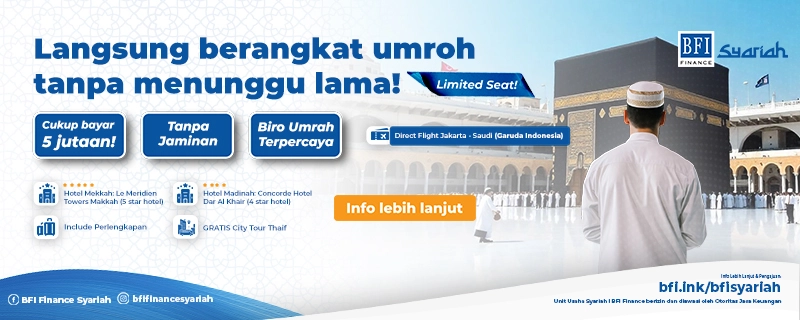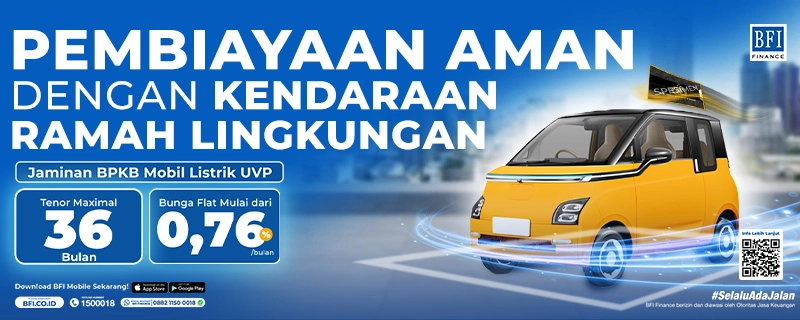Eid is over — so, how’s your wallet doing? Most likely, it feels a lot lighter than before, right? Don’t worry, BFI Friends! Now is the perfect time to get your finances back on track. Here are some smart ways to manage your finances after Eid, according to the BFI Finance Team.
1. Review Your Eid Spending

Image Source: Freepik
The first and most important step in managing your finances after Eid is to review and evaluate your financial activities. Take time to go over all your spending during the Eid festivities.
List everything — from household needs, Eid bonuses (THR) for family members, hampers for friends, travel expenses for going back to your hometown, to those small snack purchases that often go unrecorded. Track them all in detail so you know exactly where your money went.
By reviewing your expenses, you’ll get a clearer picture of your current financial condition. This will really help as the first step in planning your next financial strategy.
Remember, this evaluation isn’t about blaming yourself for past spending — it’s about learning and preparing to manage your money more wisely moving forward.
2. Create a Priority List
Once you know your current financial condition and where your Eid budget went, it’s time to create a list of priorities. This is one of the best ways to manage your post-Eid finances, according to BFI Finance.
Start by listing your most urgent needs — daily necessities, utility bills (electricity, water, internet), transportation costs, and children's or school expenses. Rank them from the most important to the least urgent.
Don’t forget to set a spending limit for each category. This will help you stay disciplined and avoid unnecessary expenses.
With a clear priority list, your financial management will be more focused and less vulnerable to impulse buying temptations.
3. Limit Daily Expenses
After Eid, it’s time to return to reality. Daily expenses need to be controlled so your finances can recover quickly. Start saving in every aspect — from small things to larger needs.
For example, cook meals at home instead of eating out, cut down on dining out habits, and take advantage of promos or discounts wisely. If something isn’t urgent, postpone the purchase for later.
Remember, being thrifty doesn’t mean being stingy — it means managing your money smartly so you don’t feel even more financially burdened after a spending spree during Eid.
4. Pay Off Eid Debts
For those who relied on debt to cover Eid expenses, now is the time to focus on repaying those obligations. Don’t let debts linger and pile up into a bigger problem in the future.
Record all your debts in detail, determine which ones need to be paid off first, and create a payment strategy that fits your financial situation. You can pay in installments — as long as it’s consistent and routine. Once your debts are settled, you’ll feel more at ease and sleep better at night.
5. Set Aside Money for Savings
Even though your finances might still be in recovery mode after Eid, don’t forget to set aside a portion of your money for savings. This is essential for unexpected expenses in the future.
It doesn’t have to be a large amount — start small as long as you’re consistent every month. Savings can be a lifesaver during emergencies or help you achieve long-term goals like vacations, children’s education, or future investments. Let’s get back into the habit of saving!
6. Don’t Overspend!
Last but definitely not least — resist the urge for impulsive shopping! After Eid, there are usually many tempting promos, big discounts, or easy installment offers.
Remember, don’t go on a shopping spree just because of low prices. Make sure every expense is well-considered and based on real needs, not just impulse or temptation.
Being wise in managing your finances will prepare you better for the days ahead. A safe wallet, a peaceful mind, and a brighter future!
Managing your finances after Eid does come with its challenges, but don’t worry — with the right financial management steps, your financial condition can gradually recover.
If you have big plans for the future — such as starting a business, expanding your current one, or needing extra funds for other important needs — don’t give up just because of limited capital.
BFI Finance is here with financial solutions to help meet your needs. With collateral such as motorcycle BPKB, car BPKB, or house/shop certificates, you can get funding through an easy process and long-term installments.
#SelaluAdaJalan with BFI Finance.






